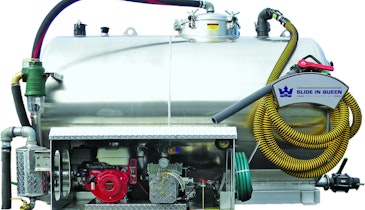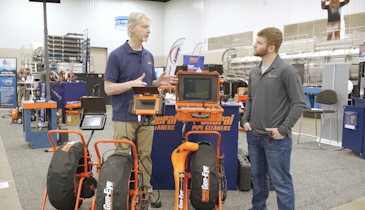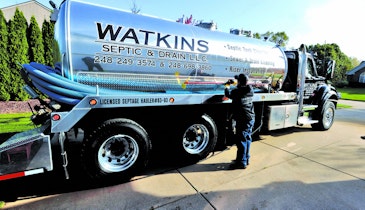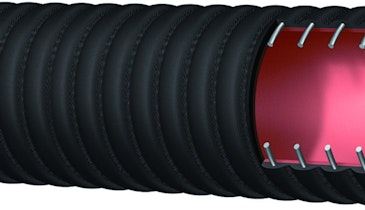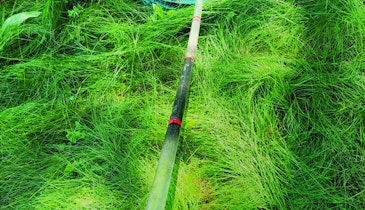Jeff Martindale is a Texan. It comes as no surprise, then, that his septic and portable restroom company serves a large area, or that he has large ambitions.
A self-described workaholic, Martindale, 52, runs a five-man septic and portable restroom operation in East Texas, northeast of Houston and just west of the Louisiana border. His seven-county service area — at 5,899 square miles — is larger than Connecticut, Delaware or Rhode Island.
“I don’t care how big I get. There is no limit,” says the owner of Lake Area Septic & Sludge Operations, also known as LASSO, of Jasper, Texas. “We are going to grow this business and we are going to take care of it and we are going to keep it. It isn’t going away as long as we are here.”
Half septic, half portables
LASSO’s business is about evenly split between septic and portable restroom operations. The company supplies portable restrooms for oil businesses and festivals, rushes trailer-loads of portable restrooms to natural-disaster sites and hopes to increase its septic business by collecting sludge from municipal waste-treatment plants.
“I think the toilets will probably outgrow septic, but it’s not going to be right now. I can’t pick one over the other. They complement each other,” he says.
Martindale began the portable restroom business while getting his land application site operational. He disposes of septic waste on a 30-acre field, while portable restroom waste must go to a wastewater treatment plant.
Martindale is working to get an additional 25 acres certified for application so he can begin collecting sludge from municipal treatment plants. He says there are a number of plants within 20 miles of his business that are looking for a place to dispose of their sludge. Two have committed to him and a third is considering it.
“They are having to ship it so far. It costs,” he says.
Martindale is increasing his disposal area because he expects there will be more metals, such as lead, mercury and chromium, in the waste.
“Your metals will get up on you if you have a small site and go to dumping all that on it,” he says. “You can’t just keep pounding them in there. They don’t go away.”
Martindale says he will have enough certified acres for now, but he expects to need more. Fortunately, he owns about 300 acres, so expansion is possible.
But getting permits in East Texas is difficult.
“You can get one in West Texas; they don’t have any water,” he says. “We have a lot of freshwater.”
He is only eight miles from the 114,500-acre Sam Rayburn Reservoir and has a monitoring well on his site.
Texas law prohibits growing anything for human consumption on the land within 18 months of application. Martindale grows hay. Some he feeds to his cattle and some he sells.
Miles and miles of texas
Texas being Texas — that is large — quick transportation is problematic.
Martindale is a pilot and uses a Piper Super Cub that he keeps in a pasture at his home for some business. For example, when he needs to take a truck to the dealership, which is three hours away by road, he’ll fly down and pick up his driver and bring him home.
“It saves you time and it’s not as boring as driving,” he says of flying.
But the airplane doesn’t help when it comes to running routes and making deliveries and pickups.
“I just came off a 47.9-mile carry-to,” he said the day of this interview. “I’m on the road all the time. I did 295 miles the other day. That was just me (not counting his other drivers).”
As much as possible, he tries to do restroom service on weekends and septic work on weekdays.
Distance and state regulations are factors in routing and starting times. Because waste can’t be mixed, portable restroom service routes that cannot wait until the weekend start early in the morning, between 1 and 4 a.m.
“Starting with toilets that early, there’s nobody using them, no traffic, no school buses, nobody parked in front of them,” he says.
The drivers will return before noon, at which point they begin septic routes, the most frequent of which he tries to keep on a regular rotation. Martindale says he works 13 to 14 hours a day. His employees “may work 12 hours a couple of days a week. I work more than any of them.”
Martindale keeps three trucks on the road, including a 2001 International 4300 with 2,000-gallon aluminum tank, a 2004 International 4300 with 2,500-gallon aluminum tank built by Keith Huber Inc., a 2007 Kenworth T300 with 2,000-gallon stainless steel tank built by Best Enterprises Inc., and a 1998 Ford F-450 with a steel slide-in unit from Lely Manufacturing Inc.
The right stuff for service
He says the septic work increases in winter. Texas roads are good, but getting off the road that time of year or in rainy weather can be a problem.
“My trucks are good enough and of a quality we can pump 125 feet. We don’t like to pull that far, but I’m not going to drive 75 miles and not do it. It ain’t fast, but it’s better than going home with nothing,” he says. “If it’s wet, you’ve got to do it. You don’t want to wreck the yard.”
He also has a cargo trailer and three restroom transport trailers, two of which can carry 12 units and one that carries 20 restrooms or 30 hand-wash stations.
He has a 400-gallon waste/200-gallon freshwater slide-in unit by Lely Manufacturing Inc., 400 portable restrooms (8 handicap units) from PolyJohn Enterprises, Polyportables Inc. and Hampel Corp., and 30 portable hand-wash stations from PolyJohn.
Martindale decided to go into the portable restroom business after he determined another company providing services to the area could use some competition. At the time he was operating Martindale Tree Service, a right-of-way-clearing business that he has since sold to his son.
“I’m a workaholic. You probably don’t know any as bad as I am,” he says.
Martindale says it took about three years before the pumping businesses were running smoothly. He bought new portable restrooms as he could afford them, gradually expanding his reach.
Keeping the crew happy
Martindale says his is a pretty big operation for the area. It’s a competitive business, but he says he’s got a good crew that knows the business and some part-time help available when he needs it.
“I don’t have turnover. Any. None. I work. None of my people work more than I do. I try to do the weekends and try not to let them do that,” he says.
Other than a Commercial Drivers License, no special training is required by the county or state. He teaches workers how to do their job, and his wife, Nadia, who is a nursing instructor, takes care of health-safety training.
“They go and they learn. We do that for some time. I want them to know how I do it, and that’s how I want it done,” he says.
High oil prices have meant more work for LASSO. Drilling is active in East Texas and the need for portable restrooms is high. The payout is good, but it’s a segment of the business that requires more work than most.
“They may use them a week; they may use them a month; they may use them a year,” Martindale says. “They are always moving and they are not good roads, either.”
He says he had probably 80 units in oil fields last spring, and he charges daily rates because the roads are so marginal.
“I charge mileage, too, because you have to,” he says. “They are not on a paved road and they want them now. It’s demanding and they just are everywhere. You’ve got truck traffic and it doesn’t ever quit in the oil field.”
Martindale said daily rate totals drive his monthly bill per restroom to about four times his standard monthly service fee.
“You have to keep up with exactly what day you put them out. They’ll move from field to field or rig to rig regularly.”
For all that, he says, it’s worthwhile business.
Doing a good deed
Martindale does other things that keep people thinking of him. He says a couple of years ago there was a large church fire. He loaded up some portable restrooms and dropped them off for the guys fighting the blaze.
“They don’t pay for that. I left them out until they got through with them,” he says.
Otherwise, festivals and fishing tournaments account for a lot of his business, and he’s always looking for new events and new areas to work. He likes to start with portable restrooms in a new area. That leads to septic work.
“People are going to call. They say ‘we see your trucks everywhere,’” he says.
He recently serviced the Tyler County Dogwood Festival in Woodville. Again, he got the business because he was willing to provide the requested services. One of the festival’s concerns was that the company that did the job before left restrooms sitting around the courthouse square for several days after the event.
“They called me and asked me what I’d do it for. It cost them a little more, but when they get done with (the restrooms), I go get them,” he says. “When you build a company and are doing it yourself, you can say ‘yes’ and it’s ‘yes,’ and you can say ‘no’ and it’s ‘no.’ You don’t have to have a meeting.
“Customer service is all I’ve got to sell. If I don’t do what I’m supposed to do, you won’t call me back.”
